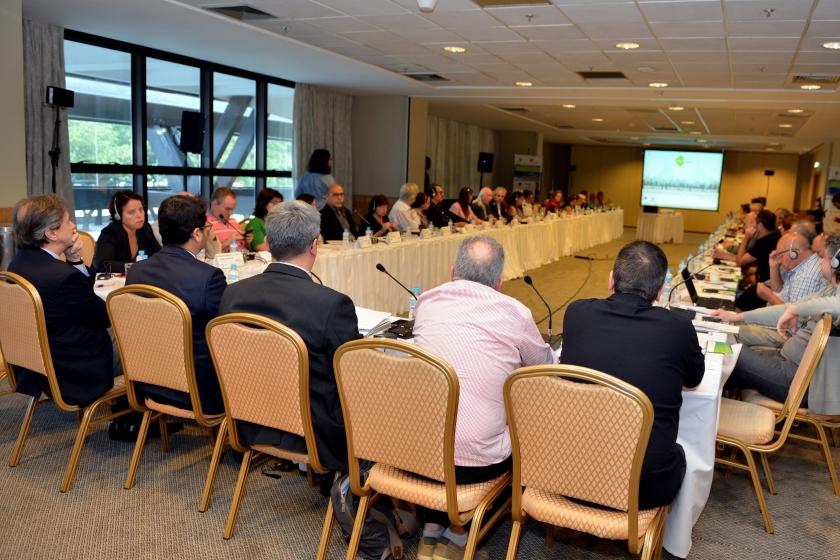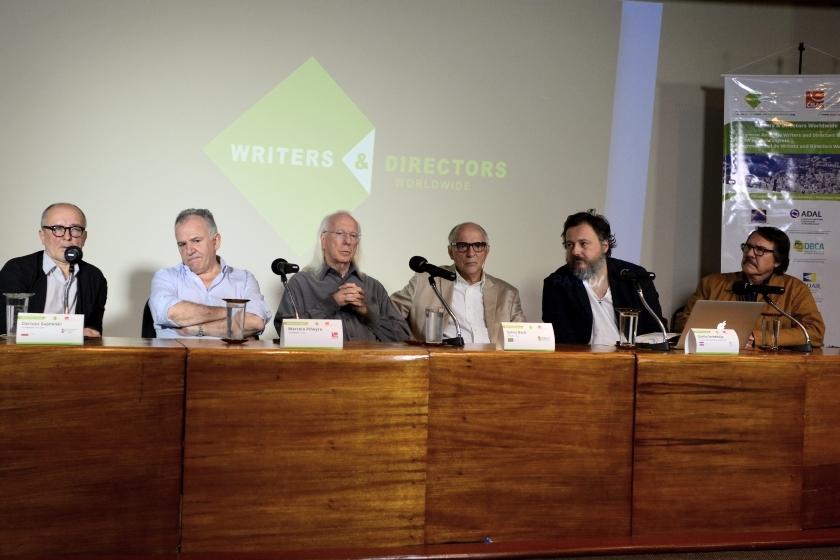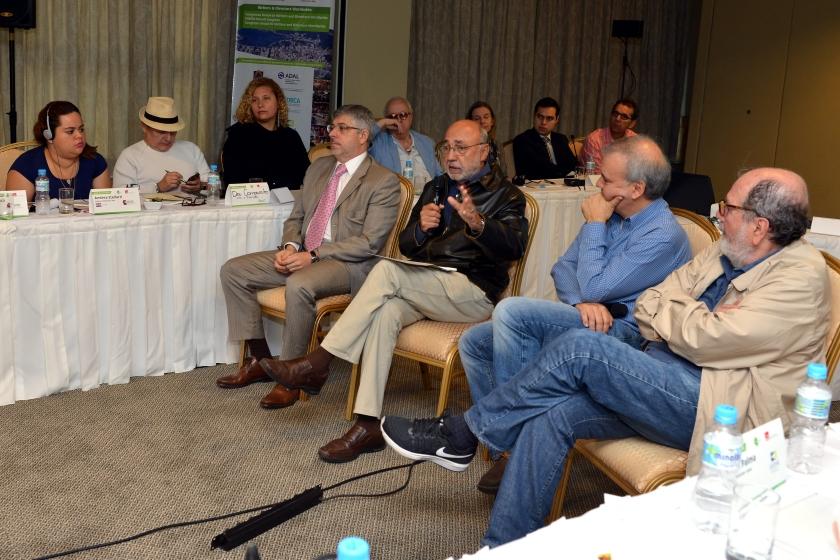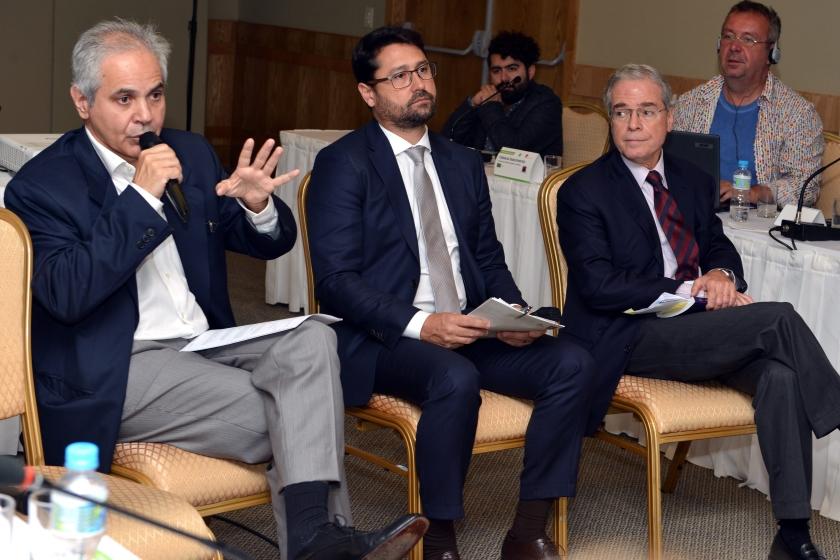Rio de Janeiro welcomes the 2016 Writers & Directors Worldwide Congress

Authors and creative leaders gathered in Brazil on 28-30 September for the annual Writers & Directors Worldwide Congress, organised by W&DW and CISAC with host societies and sponsoring partners including ABRAMUS, ADAL, ARGENTORES, DAC, DBCA, GEDAR and Order of Attorneys of Brazil in Rio de Janeiro (OAB-RJ). W&DW is the international creators’ council for audiovisual authors that champions and protects the rights of writers and directors working in audiovisual, literary and dramatic repertoires.
The first day started with a dialogue between film/television directors, screenwriters, documentary and animation directors as well as cinema teachers and students. This open meeting, as well as a documentary screening, took place at the Museu Histórico Nacional. Moderated by W&DW President Yves Nilly with the Master of Ceremonies as lawyer and OAB-RJ Director of Culture and Events Paula Vergueiro, the dialogue featured CISAC Vice President, film director and DAC President Marcelo Piñeyro; Pepe Sánchez; ATN Vice President Silvio Caiozzi; SFP-ZAPA Vice President Dariusz Gajewsky; DBCA President Sylvio Back; screenwriter, producer and TV/film director Antonio Carlos da Fontoura and Croatian Film Directors Guild (DHFR) President Danilo Serbedzija. During discussions, Paula Vergueiro explained why authors’ rights exist in Brazil and that she believes there is a distortion in authors’ rights that should be corrected. Sylvio Back spoke to the exponential growth of filmmakers from 13 to 200 in the course of a year. DAC support has been crucial to the creation of DBCA due to their belief that a CMO for directors could be created. Marcelo Piñeyro noted the difficulties faced by Latin American creators before calling “all creators of the world to think globally and help create national legislation.”

W&DW has been active not only in protecting rights, but also supporting structures that may not have existed, with the financial and technical support from ADAL and DAC. This was the case with the first Brazilian screenwriters society, Gestão de Direitos Autorais de Autores Roteiristas (GEDAR), which was inaugurated after the dialogue. The ceremony heralding GEDAR’s founding included GEDAR member directors, authors and screenwriters Marcílio Moraes, GEDAR Vice President Thiago Dottori, Sylvia Palma, Rafael Leal and GEDAR associates including GEDAR and DBCA Legal Advisor Daniel Pitanga. Vice President Thiago Dottori declared, “I welcome the union, cooperation and coming together of two organisations of screenwriters with all authors, filmmakers and directors.” Closing, Daniel Pitanga called for support for GEDAR to help it receive reciprocal agreements with other CISAC member audiovisual societies.
See the photo gallery.
An equally momentous occasion occurred with the ceremony for DBCA’s first payment of foreign authors’ rights by DAC to Brazilian film and TV directors. DBCA General Secretary Ricardo Pinto e Silva and DBCA Treasurer Guilherme de Almeida Prado moderated the ceremony. Guilherme de Almedia Prado read off the names of the first directors to receive royalties. Producer and Bruno Barreto’s father, Luis Carlos Barreto declared,
Thanks to this payment, Brazilian directors have finally had their profession recognized. Congratulations to everyone!”
The afternoon gave people a moment to absorb the morning’s events with a screening of “The Music According to Tom Jobim”, the latest documentary of Nelson Pereira dos Santos on the life of Tom Jobim, the author of “Garota de Ipanema”.
The first day came to a conclusion with the decision that the inaugural Writers & Directors Worldwide Honour Prize ceremony, awarded to Colombian Congresswoman Clara Rojas, will be given at the next CISAC Regional Latin American and Caribbean Committee meeting in April 2017. The award recognises exceptional contributions to the protection of audiovisual authors’ rights. Ms Rojas has spent the past 10 months campaigning for changing the law allowing, for the first time, Colombian audiovisual creators to receive an equitable share in the success of their work. The “Pepe Sanchez Act” has been led by societies Directores Audiovisuales Sociedad Colombiana (DASC) and Red Colombiana de Escritores Audiovisuales (REDES) with global support from W&DW and CISAC.
Upon the announcement, W&DW President Yves Nilly stated,
The support of people like Ms. Rojas is absolutely vital to our campaign, so it’s a great pleasure to be able to honour her contribution. We will continue fighting to give audiovisual creators from all over the world the same opportunities to make a fair living from their work”.
The second day was dedicated to Brazil. W&DW President Yves Nilly opened by thanking participants as well as Ministry of Culture Secretary of the Economy of Culture Dr Claudio Lins de Vasconcelos for attending. Yves Nilly then addressed participants that the potential of cultural industries cannot work without a law establishing clear rules for authors. He noted that 130,000 authors in Europe are asking for an unwaivable remuneration right. Thanks to the adoption of the Larrain Law in Chile and soon in Colombia, the Audiovisual Campaign is being promoted worldwide.
CISAC Regional Director for Latin America and the Caribbean Santiago Schuster welcomed Dr Claudio Lins de Vasconcelos, particularly on his first day in office. Santiago Schuster reflected upon a past when he saw the works of creators in several Latin American countries stripped of rights, which excluded screenwriters and directors from the economic rights for the use of their works. Santiago Schuster then reminded Dr Claudio Lins de Vasconcelos that this work is “a matter of dignity”, equality and justice. “This is not about a collective of creators, but a responsibility for Latin America to undertake”.
Dr Claudio Lins de Vasconcelos thanked CISAC and W&DW for the invitation, reminding attendees of how special the congress is in terms of history due to cinema and audiovisual being part of everyone’s daily life. He continued,
The role of government is to encourage dialogue and fill gaps in the [audiovisual] production industry. There are many differences, yet not always converging interests. The most important thing is that we all have common goals and that we are on the same side”.
The day dedicated to Brazil then switched to a panel on the country’s history in regards to the rights of authors, directors and screenwriters by DBCA Brazil President Sylvio Back. Panellists included Latin America Memorial President (São Paulo) João Batista de Andrade; animation director Kiko Mistrorigo; film director Carlos Diegues; and OAB-RJ Commission of Authors Rights, Intellectual Property and Entertainment (CDADIE) and the Institute of Brazilian Lawyers (IAB) President and lawyer Sydney Sanches. One of the founders of Cinema Novo and multi-award winning director, Carlos Diegues gave the perspective on the work of Brazilian authors starting their career and needing to receive remuneration. Attendees were honoured by his participation and sharing his experience. Kiko Mistrorigo spoke about pressure he received in surrendering his rights. In 2000, a channel forced him to sign away his rights, which leaving him in a precarious position.

The panel then discussed the Nelson Pereira dos Santos Law, a project that is planned to be presented with the goal of bringing remuneration to Brazil for screenwriters and directors from the public broadcast of their works. The project is named after multi-award winning director and member of the Brazilian Academy of Letters, Nelson Pereira dos Santos. Yves Nilly stated,
Brazil has one of the most vivid and innovating film and audiovisual industry, Brazil’s screenwriters and directors are celebrated around the world. It would be only justice and equity if Brazilian law puts these creators back at the heart of culture and copyright”.
Horacio Maldonado reiterated the need for such a law,
We must all strive to engage our peers with the motto for a fair and just remuneration for their creative works.”
CIAM President Lorenzo Ferrero provided his country’s experience when Italy adopted similar protections,
The effect of adopting a similar law was extremely positive for the industry. After its approval in 1997, there was a 70% jump in film production. The country is now in 5th place in all of Europe.”
For João Batista de Andrade, confusion is hurting and isolating filmmakers. He indicated that many Brazilian creators are moving to and staying in television. Sydney Sanches concluded the panel by reminding attendees that Brazil has a legislative history that protects creators and encourages the industry.
A panel on institutional and legal challenges for Brazilian directors and screenwriters, moderated by Ricardo Pinto de Silva, followed. Discussions involved lawyer Carlos Roberto Siqueira Castro, Secretary of the Economy of Culture Dr Claudio Lins de Vasconcelos, Santiago Schuster, Lorenzo Ferrero, DAC Director General Luis Mangiavillano, SACD Director of International Affairs Geraldine Loulergue and DASC Legal Advisor Adriana Saldarriaga. Luis Mangiavillano spoke to the Argentinian experience on how law applies to remuneration. Geraldine Loulergue mentioned that, in Europe, only a few countries have laws as strong as in Italy. Only a handful of countries exist where authors are paid when works are downloaded from platforms.

Dr Claudio Lins de Vasconcelos then called for an audiovisual value chain based on solidarity, inclusivity, strength and sustainability. Santiago Schuster stated that the right to remuneration for directors and screenwriters is the best way to ensure that this chain is strong and inclusive. Yves Nilly, greeting Dr Vasconcelos, expressed special interest from CISAC and W&DW for a collaborative effort that achieves the purposes outlined in this speech.
Afterwards, ARGENTOS and ABRAMUS led a grand right in Brazil and Latin America panel. Panellists included TV and drama author Miguel Angel Diani; drama and literature author’s agent Lucia Riff; author Sonia Rodrigues; author and ATN Director General César Cuadra; author and REDES President Alexandra Restrepo; film director and SIAE Board Member Biagio Proietti; writer and theatre lecturer ZAiKS Board Member Malgorzata Semil; and author and screenwriter Doc Comparato. Doc Comparato opened by speaking about his experience as an author and the difficulties they face. Lucia Riff noted that authors have been in an unbalanced position, faced with unconscionable contracts weighed against them. The rights of literary authors also came up, who are also faced with receiving nothing after the initial value in signing a contract, just like screenwriters and directors.
Sonia Rodriguez administers the works of Nelson Rodriguez, the most plagiarized author. She noted that while there is only a small sum paid for adaptations, no further participation is generated by the exploitation of works. César Cuadra said that cinema has started to change the situation where the author “has to be poor”, instead starting to create a position where “you can be a poet and rich”.
The final panel treated the participation of authors in the public life of their countries, moderated by SPAutores President and CISAC European Regional Committee Chair José Jorge Letria. Participants included drama author and screenwriter Maria Adelaide Amaral; author and screenwriter Lauro César Muniz; author and screenwriter Marcos Bernstein; Felipe Radicetti of MUSIMAGEM; as well as author and SGAE International Affairs Coordinator Iván García Pelayo.
The third and final day of the W&DW Congress in Brazil allowed international reports, projects and strategy to take to the stage. Yves Nilly started in the morning with a W&DW international report, including W&DW Vice President, CISAC Vice President and DAC Secretary General Horacio Maldonado; Géraldine Loulergue; and author and Iván García Pelayo.
Horacio Maldonalo expressed his happiness on progress made since 2011 in developing W&DW. The overarching goal was being able to collaborate and support other Latin American countries where works were being shown. After signing a Memorandum of Understanding with ARGENTORES and the ADAL alliance, they are working on creating screenwriter and director societies in the region. He reminded that it is possible to collect and receive payment for copyrighted works today. Horacio Maldonaldo declared,
The time to move forward and strengthen our rights is now”.
Next on the agenda, Lorenzo Ferrero with Iván García Pelayo provided updates on the W&DW Africa Project. According to Yves Nilly, W&DW Africa could be the entity uniting all parties, authors and associations spanning documentary, literary and television domains in the region. Angèle Diabang received excellent feedback about the project from literary authors. In order to achieve this, partners and additional help will be required. Lorenzo Ferrero then detailed PACSA and what was learned from this alliance. The program began with Rwanda and will work with music creators in the Congo soon. Technical training workshops have been in high demand in Africa, particularly to help develop and enter international markets. Other developments include a meeting during the FESPACO film festival and SPAutores developing an operations centre on the continent.
SCAM Director Gilles Cayette introduced a focus on documentaries along with Institute of Television Studies Director and President Nelson Hoinnef, film director João Moreira Salles as well as musician and MUSIMAGEM President Marcos Souza. Gilles Cayatte spoke to the importance of documentaries, its growth and their own fight for fair remuneration. The panel brought up one of the difficulties for documentaries being the fact TV channels prefer series. Directors and screenwriters also do not charge royalties for the public display of their work. Nelson Hoinnef mentioned that documentaries are “one of the most noble and creative ways of making films”, reinforcing the need to support this type of creation.
The spotlight shifted to author and screenwriter Bosco Brasil along with Malgorzata Semil, Ivan Garcia Pelayo and Biagio Proietti, who presented on drama. In Italy, Biagio Prioetti indicated a recovery of 2.5% is expected by year end. Recent developments in this sector include SIAE’s efforts to digitize works as well as create an online licensing process. Ivan Garcia Pelayo brought up the model of public outreach, Zarzuela, as well as an overview of theatre in Spain.
A screenwriters discussion followed with the GEDAR Board, Marcílio Moraes, Sylvia Palma, ABRA President Ricardo Hoffsteter and Igor Mirkovic of DHFR. Marcílio Moraes discussed his experience as a television writer for telenovelas. Sylvia Palma spoke on the importance of writers, indicating that GEDAR should be admitted as a CISAC member to support creators.
The congress concluded with overwhelmingly agreement that increasing cooperation between organizations, alliances and entities is key in achieving increased protection and rights for writers and directors.
Video produced by Argentinian society DAC.
